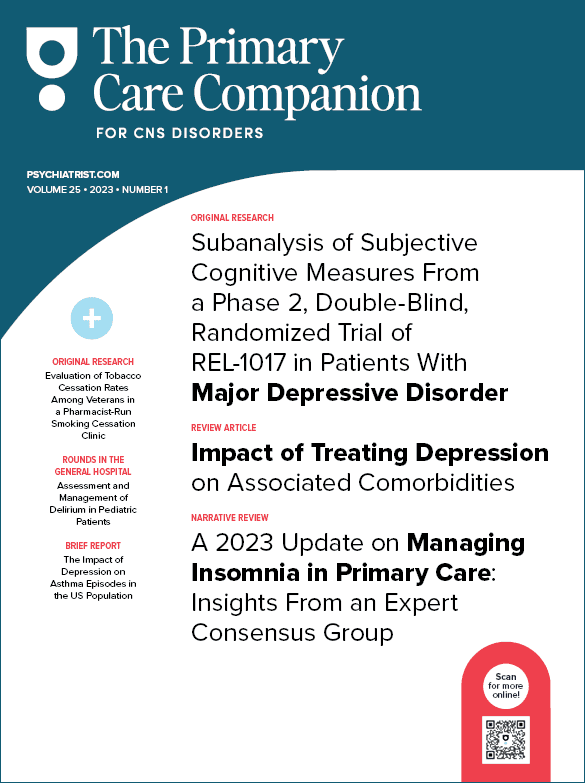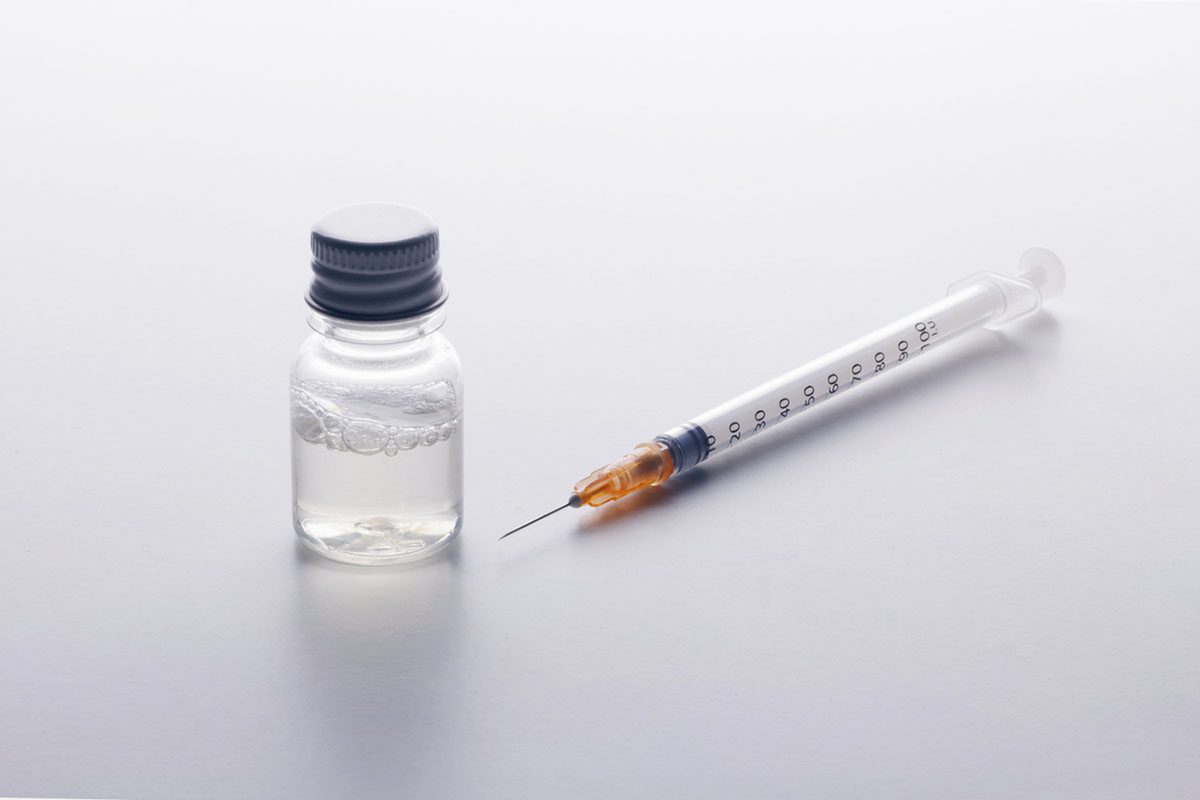A Rare Case of Fatal Hyponatremia Due to a Combination of Psychotropic Polypharmacy and Hypothyroidism
To the Editor: Hyponatremia is a very common electrolyte abnormality seen in hospitalized patients. Mild hyponatremia is generally asymptomatic, but severe hyponatremia can be fatal. Hyponatremia is a rare but well-known complication of selective serotonin reuptake inhibitors (SSRIs). Hypothyroidism is also independently known to cause hyponatremia. So far, fatal hyponatremia due to psychotropic polypharmacy has been reported only once.1 Here, we report a rare case of a 44-year-old man with fatal hyponatremia due to a combination of psychotropic polypharmacy and hypothyroidism.
Case report. Mr A, a 44-year-old obese man (body mass index = 34.8 kg/m2), was found unresponsive by his family in the month of January 2009 and brought to the emergency room. His history consists of hypothyroidism, schizophrenia, and depression. History from the family members was significant for change in behavior in the 24 hours preceding presentation. Also, there was no history of excess water intake or a witnessed seizure episode. His medications taken at home included paroxetine 10 mg po once daily, quetiapine 100 mg po once daily, olanzapine 20 mg po once daily, and levothyroxine 300 μg po once daily. Other medications included gabapentin 800 mg po thrice daily, omeprazole 15 mg po once daily, clonazepam 1 mg po thrice daily, and valsartan 80 mg po once daily.
Upon arrival, he was hypothermic with a temperature of 94.4°F, had no pulse, and was in asystole. He was aggressively resuscitated, and he regained normal sinus rhythm. Postresuscitation electrocardiogram showed ST segment depression in V1 and V2 with diffuse ST-T wave abnormality. He was started on a dopamine drip for hypotension and immediately taken to the cardiac catheterization laboratory due to the electrocardiographic changes and cardiac arrest, but no significant abnormalities were found in his coronary arteries. Meanwhile, his laboratory values were significant for serum sodium level of 107 mEq/L, serum chloride level of 71 mEq/L, and serum thyroid-stimulating hormone level of 63.03 UIU/mL. Other significant laboratory values included serum glucose level of 200 mg/dL, serum calcium level of 7.7 mg/dL, and serum lactic acid level of 6.2 mmol/L, as well as serum levels of cardiac enzyme creatine phosphokinase (5606 U/L) and the creatine kinase-MB fraction (72.2 ng/mL); MB index and serum troponin levels were within normal limits. Urine drug screen was positive for benzodiazepines, consistent with his clonazepam prescription, and his serum toxicology was negative. Serum osmolality and urine osmolality could not be obtained. His complete blood count and chest x-ray were within normal limits. Computed tomography scan of the brain revealed extensive hypoxic ischemic injury with extensive infarction and diffuse brain injury.
Mr A was transferred to a medical intensive care unit, where he remained comatose and continued to be hypotensive. Due to the presence of severe hyponatremia, he was started on 3% hypertonic saline infusion with an aim to increase the serum sodium gradually to 120 mEq/L. He was also started on intravenous levothyroxine.
Despite aggressive medical treatment, his hemodynamic status did not improve and he continued to be comatose, following which his family agreed to withdraw life support measures.
Depression is a very commonly encountered illness in primary care practice. SSRIs are very widely prescribed drugs for the treatment of depression and are a known cause of hyponatremia. The incidence of hyponatremia in patients taking paroxetine is 3.5/1,000/year.2 Although about 50 case reports of SSRI-induced hyponatremia have appeared in the literature so far,3 fatal hyponatremia due to psychotropic drug polypharmacy has been reported only once.1
The risk of developing SSRI-associated hyponatremia appears to be increased with advanced age, female sex, previous history of hyponatremia, comorbid medical illness, or use of concomitant medications known to cause hyponatremia or alter secretion of antidiuretic hormone (ADH).4
The etiology of hyponatremia associated with SSRI use is highly controversial. Although there are some studies showing no elevation of ADH,5,6 the majority of the reports claim syndrome of inappropriate antidiuretic hormone secretion (SIADH) to be the cause of hyponatremia.4,7 Hyponatremia in these studies is seen soon after initiation of therapy with an SSRI, with the median time being 13 days according to previously published reports,2 and 75% of cases presented within 30 days after initiation of therapy.7 Delayed onset has also been reported, with 29% of patients presenting more than 3 months after beginning SSRI therapy.3,7 Quetiapine has also been reported to cause hyponatremia.8
The pathophysiology underlying hyponatremia in hypothyroidism is incompletely understood. Some studies claim that reduced cardiac output in hypothyroidism can lead to release of ADH via the carotid sinus baroreceptors,9-11 whereas other studies have claimed that the glomerular filtration rate and renal blood flow decrease in hypothyroidism and thereby can decrease free water excretion by diminishing water delivery to the diluting segments.12 Some reports cite indirect evidence that SIADH is the cause of water retention in hypothyroidism, thereby causing hyponatremia.13,14
However, more recent reports by Macaron and Famuyiwa15 proved that the ADH levels are appropriately suppressed and therefore do not contribute to the hyponatremia of hypothyroidism. This was further proved correct by failure of demeclocycline to correct the hyponatremia and low serum levels of ADH, leading to the conclusion that SIADH is not the cause of hyponatremia in such patients.15
It may be important to monitor sodium levels closely when a patient is started on SSRI treatment, especially in people with risk factors like advanced age, female sex, and comorbid illnesses and those on treatment with other medications known to cause hyponatremia. If the clinician considers the risk significant, baseline level of serum sodium should be obtained before the first dose.4 Follow-up levels of serum sodium should be obtained at least after the first 2 weeks of treatment4 or at 2-4 weeks after initiation of therapy.7 In case of mild hyponatremia, if the continuation of medication is required, close monitoring of levels of sodium is desired.4 Restriction of fluid intake is somewhat successful, although patient compliance is often poor.16 It is very important to consider the risks and benefits of continuing the treatment in such cases, and clinical judgment is required to make a decision. In almost all cases, the hyponatremia was reversed 2 days to 6 weeks after withdrawal of SSRIs depending on the serum sodium level at presentation.3,7 No guidelines are mentioned in the literature for the management of hyponatremia due to atypical antipsychotics. Also, no specific guidelines exist for routine monitoring of sodium in hypothyroidism.
In our case, hyponatremia could be accounted for due to both psychotropic polypharmacy as well as hypothyroidism, eventually proving fatal. Although fatal hyponatremia due to SSRI use has been reported only once, to our knowledge fatal hyponatremia due to a combination of psychotropic polypharmacy and hypothyroidism has not been reported so far. It is highly prudent that serum sodium level should be routinely monitored closely in high-risk patients to avoid potentially fatal complications of a common and easily treatable medical condition.
References
1. Vucicevic Z, Degoricija V, Alfirevic Z, et al. Fatal hyponatremia and other metabolic disturbances associated with psychotropic drug polypharmacy. Int J Clin Pharmacol Ther. 2007;45(5):289-292. PubMed
2. Corrington KA, Gatlin CC, Fields KB. A case of SSRI-induced hyponatremia. J Am Board Fam Pract. 2002;15(1):63-65. PubMed
3. Rottmann CN. SSRIs and the syndrome of inappropriate antidiuretic hormone secretion. Am J Nurs. 2007;107(1):51-58.
4. Fabian TJ, Amico JA, Kroboth PD, et al. Paroxetine-induced hyponatremia in the elderly due to the syndrome of inappropriate secretion of antidiuretic hormone (SIADH). J Geriatr Psychiatry Neurol. 2003;16(3):160-164. PubMed doi:10.1177/0891988703255689
5. Marar IE, Towers AL, Mulsant BH, et al. Effect of paroxetine on plasma vasopressin and water load testing in elderly individuals. J Geriatr Psychiatry Neurol. 2000;13(4):212-216. PubMed doi:10.1177/089198870001300407
6. Faull CM, Rooke P, Baylis PH. The effect of a highly specific serotonin agonist on osmoregulated vasopressin secretion in healthy man. Clin Endocrinol (Oxf). 1991;35(5):423-430. PubMed doi:10.1111/j.1365-2265.1991.tb03560.x
7. Liu BA, Mittmann N, Knowles SR, et al. Hyponatremia and the syndrome of inappropriate secretion of antidiuretic hormone associated with the use of selective serotonin reuptake inhibitors: a review of spontaneous reports. CMAJ. 1996;155(5):519-527. PubMed
8. Atalay A, Turhan N, Aki OE. A challenging case of syndrome of inappropriate secretion of antidiuretic hormone in an elderly patient secondary to quetiapine. South Med J. 2007;100(8):832-833. PubMed
9. Discala VA, Kinney MJ. Effects of myxedema on the renal diluting and concentrating mechanism. Am J Med. 1971;50(3):325-335. PubMed doi:10.1016/0002-9343(71)90221-X
10. Derubertis FR Jr, Michelis MF, Bloom ME, et al. Impaired water excretion in myxedema. Am J Med. 1971;51(1):41-53. PubMed doi:10.1016/0002-9343(71)90322-6
11. Hanna FW, Scanlon MF. Hyponatraemia, hypothyroidism, and role of arginine-vasopressin. Lancet. 1997;350(9080):755-756. PubMed doi:10.1016/S0140-6736(05)62563-9
12. Montenegro J, Gonzסlez O, Saracho R, et al. Changes in renal function in primary hypothyroidism. Am J Kidney Dis. 1996;27(2):195-198. PubMed doi:10.1016/S0272-6386(96)90539-9
13. Skowsky WR, Kikuchi TA. The role of vasopressin in the impaired water excretion of myxedema. Am J Med. 1978;64(4):613-621. PubMed doi:10.1016/0002-9343(78)90581-8
14. Laczi F, Janסky T, Ivסnyi T, et al. Osmoregulation of arginine-8-vasopressin secretion in primary hypothyroidism and in Addison’s disease. Acta Endocrinol (Copenh). 1987;114(3):389-395. PubMed
15. Macaron C, Famuyiwa O. Hyponatremia of hypothyroidism: appropriate suppression of antidiuretic hormone levels. Arch Intern Med. 1978;138(5):820-822. PubMed doi:10.1001/archinte.138.5.820
16. Kirby D, Ames D. Hyponatraemia and selective serotonin re-uptake inhibitors in elderly patients. Int J Geriatr Psychiatry. 2001;16(5):484-493. PubMed doi:10.1002/gps.367
Author affiliations: Division of Internal Medicine-Pediatrics (Dr Musham) and Division of Internal Medicine (Dr Jarathi), Michigan State University College of Human Medicine, Michigan State University/Kalamazoo Center for Medical Studies; and Adult Critical Care (Dr Pedraza), Kalamazoo, Michigan.
Potential conflicts of interest: None reported.
Funding/support: None reported.
Prior presentation: Poster presented at the American College of Physicians Michigan meeting; September 25-27, 2009; Traverse City, Michigan.
Published online: July 15, 2010 (doi:10.4088/PCC.09l00897gre).
Prim Care Companion J Clin Psychiatry 2010;12(4):e1–e2
© Copyright 2010 Physicians Postgraduate Press, Inc.




